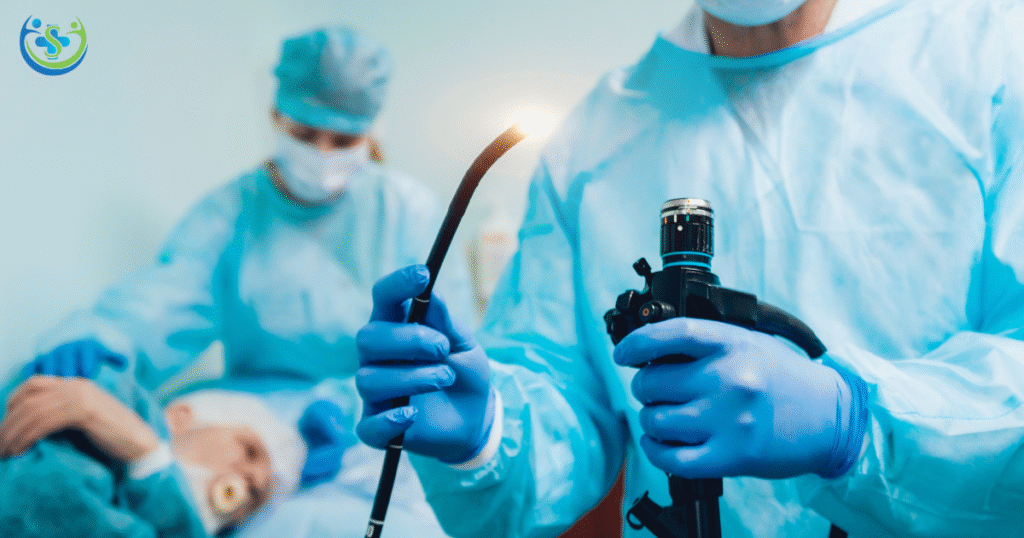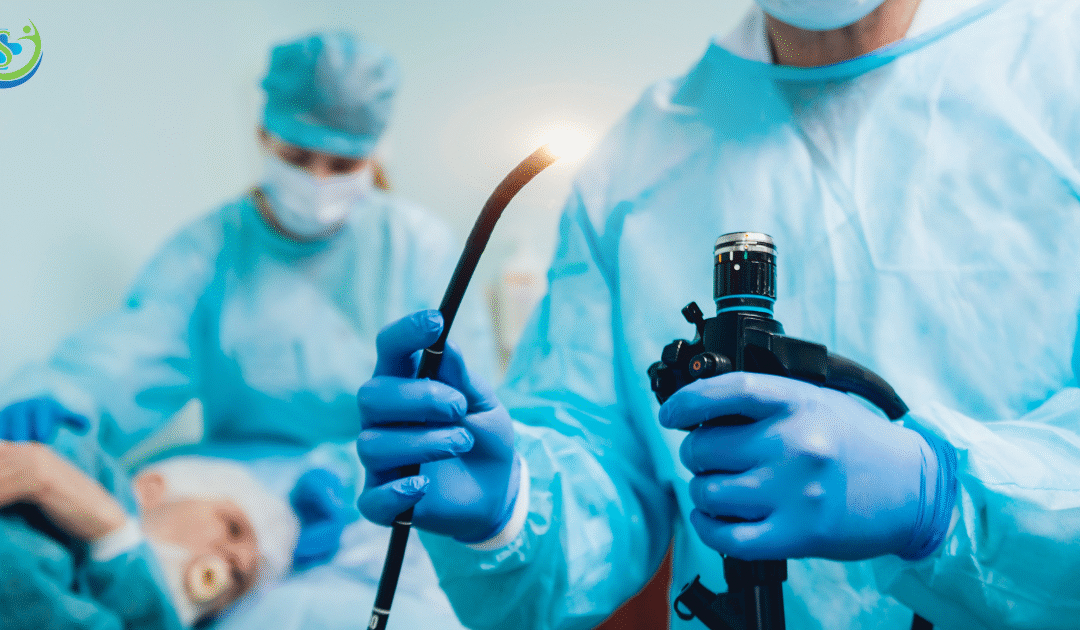When digestive problems start affecting your daily life, finding the Best Endoscopy Doctors in Chennai becomes a top priority. Endoscopy serves as a window into your digestive health, helping doctors see what’s happening inside your body without making large cuts. This medical procedure has changed how we diagnose and treat digestive issues, making it safer and more comfortable for patients.
Many people feel nervous about endoscopy procedures. You might wonder what happens during the test, how much it costs, or how to prepare. We understand these concerns because digestive health problems affect millions of people every day. This guide will walk you through everything you need to know about endoscopy, from finding skilled doctors to understanding the recovery process.
Table of Contents
- What Is Endoscopy and How Does It Work?
- Types of Endoscopy Procedures Available
- Finding the Best Endoscopy Doctors In Chennai
- Understanding Endoscopy Cost In Chennai
- When Should You Consider Endoscopy?
- Preparing for Your Endoscopy Procedure
- What Happens During the Endoscopy Procedure
- Recovery and Aftercare Following Endoscopy
- Benefits and Risks of Endoscopy
- Finding Endoscopy Services Near You
- Advanced Endoscopic Techniques and Technology
- Conclusion
What Is Endoscopy and How Does It Work?
Endoscopy is a medical procedure that uses a thin, flexible tube with a camera to look inside your digestive system. The tube, called an endoscope, has a tiny light and video camera on one end that sends images to a monitor. Doctors can see the inner lining of your digestive tract clearly, helping them spot problems early.
The procedure works by inserting the endoscope through your mouth or rectum, depending on which part of your digestive system needs examination. Small tools can be attached to the endoscope to take tissue samples, remove objects, or treat certain conditions during the same procedure. This makes endoscopy both a diagnostic and treatment tool.
Modern endoscopy equipment provides high-quality images that help doctors make accurate diagnoses. The camera captures detailed pictures of your esophagus, stomach, and other digestive organs, allowing doctors to identify inflammation, ulcers, tumors, or other abnormalities.

Types of Endoscopy Procedures Available
Upper Endoscopy (EGD)
Upper gastrointestinal endoscopy examines the upper part of your digestive system. This includes your esophagus, stomach, and the first part of your small intestine called the duodenum. Doctors use this procedure to diagnose conditions like GERD, ulcers, and stomach cancers.
The procedure takes about 15 to 30 minutes and is relatively painless. Most patients receive sedation to help them feel comfortable during the examination. Upper endoscopy can detect problems that cause trouble swallowing, chest pain, or unexplained weight loss.
Colonoscopy
Colonoscopy focuses on your large intestine or colon. The doctor inserts a flexible telescope through your rectum to examine the entire colon. This procedure is particularly important for detecting colon cancer, polyps, and inflammatory bowel diseases.
During colonoscopy, doctors can remove polyps or take tissue samples for further testing. The procedure helps prevent colon cancer by finding and removing pre-cancerous growths before they become dangerous. Starting screening at age 45 to 49 shows greater benefits compared to waiting until age 50.
ERCP (Endoscopic Retrograde Cholangiopancreatography)
ERCP combines endoscopy with X-rays to examine the bile ducts, pancreas, and gallbladder. This specialized procedure helps diagnose and treat conditions affecting these organs. Doctors can place stents to open blocked ducts or remove gallstones during ERCP.
Finding the Best Endoscopy Doctors In Chennai
Chennai has many skilled gastroenterologists who specialize in endoscopy procedures. When looking for the Best Endoscopy Doctors In Chennai, consider their experience, qualifications, and patient reviews. Look for doctors who have performed thousands of endoscopic procedures and stay updated with the latest techniques.
Many experienced doctors in Chennai, including specialists at Dr. Sundhar Surgical & Regenerative Center, offer comprehensive endoscopy services along with advanced laparoscopic and regenerative treatments. These centers combine expertise with modern equipment to provide the best possible care.
Understanding Endoscopy Cost In Chennai
The endoscopy cost in Chennai varies based on several factors. Generally, endoscopy procedures range from ₹1,500 to ₹35,000 depending on the type of procedure and hospital chosen. Upper endoscopy typically costs around ₹2,550, while colonoscopy costs approximately ₹3,658.
(The cost details need to be checked with Dr Sundhar before publishing)
Several factors affect the total cost:
- Type of hospital (private vs. government)
- Complexity of the procedure
- Need for sedation or anesthesia
- Additional services like biopsy or polyp removal
- Location and reputation of the medical facility
Many hospitals in Chennai offer affordable endoscopy services. Some facilities provide package deals that include consultation, procedure, and follow-up care at discounted rates.
When Should You Consider Endoscopy?
Several symptoms indicate you might need to consult an endoscopy specialist. Persistent heartburn that doesn’t respond to medication requires medical attention. If you experience difficulty swallowing or feel like food gets stuck in your throat, endoscopy can help identify the cause.
Unexplained weight loss of 10 pounds or more within a year warrants investigation. Other warning signs include bloody or black stools, persistent abdominal pain, and chronic vomiting. These symptoms could indicate serious conditions that need prompt diagnosis and treatment.
For preventive care, healthy adults should consider colon cancer screening starting at age 45. Family history of digestive cancers or inflammatory bowel disease may require earlier screening. Regular endoscopic screening can detect problems before they become serious health threats.
Preparing for Your Endoscopy Procedure
Proper preparation ensures the best results from your endoscopy. For upper endoscopy, you must avoid eating or drinking for at least 8 hours before the procedure. This keeps your stomach empty so the doctor can see clearly.
If your procedure is scheduled for the afternoon, you may drink clear liquids in the morning but stop all food and drinks at least 6 hours before the exam. Your doctor will provide specific instructions based on your medical condition and the type of endoscopy planned.
Inform your doctor about all medications you take, especially blood thinners like aspirin, clopidogrel, or warfarin. You may need to stop these medications several days before the procedure. Patients with diabetes, heart disease, or high blood pressure should discuss medication adjustments with their doctor.
Remove dentures, contact lenses, and jewelry before the procedure. Wear comfortable, loose-fitting clothes that are easy to remove. Arrange for someone to drive you home after the procedure since sedation affects your ability to operate vehicles safely.
What Happens During the Endoscopy Procedure
The endoscopy process begins in a comfortable procedure room where monitors track your vital signs. A numbing spray may be applied to your throat to reduce discomfort. Most patients receive mild sedation through an IV to help them relax during the procedure.
For upper endoscopy, you’ll hold a plastic mouthpiece that keeps your mouth open while the endoscope is inserted. The doctor will ask you to swallow as the scope moves down your throat. You might feel some pressure, but the procedure shouldn’t be painful, and your breathing won’t be affected.
The camera at the tip of the endoscope sends real-time images to a video monitor. Air is introduced into your stomach to provide better visibility of the inner lining. This may cause a feeling of fullness or pressure. The entire upper endoscopy procedure typically takes 15 to 30 minutes.
If the doctor finds abnormal tissue, they can take small samples (biopsies) for laboratory testing. Polyps can often be removed during the same procedure. These additional steps don’t cause pain but may extend the procedure time slightly.
Recovery and Aftercare Following Endoscopy
After your endoscopy, you’ll be monitored in a recovery area until the sedation wears off. Vital signs like heart rate, blood pressure, and oxygen levels are checked regularly. Most people feel drowsy for a few hours after the procedure due to the sedative effects.
Common side effects include a mild sore throat, bloating, and belching. These symptoms result from air introduced into your digestive system during the procedure and typically resolve within a day. Some patients experience temporary difficulty swallowing, which improves as throat numbness fades.
Home care instructions include resting for the remainder of the day and avoiding driving or operating machinery for 24 hours. Start with clear liquids and gradually return to your normal diet as tolerated. Sucking on ice chips or gargling with warm salt water can soothe throat discomfort.
Contact your doctor immediately if you experience severe chest or abdominal pain, difficulty breathing, persistent vomiting, or fever. These symptoms could indicate complications, though serious problems are rare. Most patients return to normal activities within 24 hours.
Benefits and Risks of Endoscopy
Endoscopy offers numerous advantages for diagnosing digestive problems. The procedure provides precise, real-time images of your digestive tract, leading to more accurate diagnoses than other imaging methods. Unlike surgery, endoscopy requires no large incisions, reducing the risk of infection and complications.
Recovery time is much faster compared to traditional surgery. Most patients go home the same day and return to normal activities quickly. The procedure can both diagnose and treat conditions during the same session, eliminating the need for multiple procedures.
Endoscopy can detect early signs of cancer, significantly improving treatment outcomes. For example, finding and removing colon polyps prevents them from developing into cancer. Early detection of stomach or esophageal problems allows for prompt treatment before conditions become serious.
While endoscopy is generally safe, some risks exist. Rare complications include bleeding, infection, or perforation of the digestive tract. Sedation can cause breathing difficulties or heart irregularities in patients with serious medical conditions. Your doctor will discuss these risks and take precautions to minimize them.
Finding Endoscopy Services Near You
When searching for “endoscopy test near me” or “endoscopy hospital near me,” consider factors beyond just location. Look for facilities with experienced doctors, modern equipment, and good patient reviews. The best endoscopy centers maintain high safety standards and provide comprehensive aftercare support.
Chennai offers numerous options for endoscopy services across different areas of the city. Many hospitals provide online appointment booking and accept various insurance plans. Some facilities offer package deals that include consultation, procedure, and follow-up care at reduced costs.
Dr. Sundhar Surgical & Regenerative Center provides comprehensive digestive health services, including advanced endoscopy procedures combined with regenerative medicine approaches. Our team focuses on patient comfort and uses the latest technology to ensure accurate diagnoses and effective treatments.
Advanced Endoscopic Techniques and Technology
Modern endoscopy centers in Chennai use high-definition cameras and specialized lighting to provide clearer images. Advanced techniques like endoscopic ultrasound (EUS) combine endoscopy with ultrasound to examine deeper layers of the digestive tract. This helps detect conditions that regular endoscopy might miss.
Capsule endoscopy involves swallowing a small camera that takes pictures as it travels through your digestive system. This technique is particularly useful for examining the small intestine, which traditional endoscopes can’t reach easily. The capsule passes naturally through your system and doesn’t require retrieval.
Therapeutic endoscopy goes beyond diagnosis to provide treatment during the same procedure. Doctors can stop bleeding, remove tumors, place stents to open blocked passages, or perform other interventions. These advanced techniques often eliminate the need for major surgery.
Conclusion
Finding the Best Endoscopy Doctors In Chennai is crucial for maintaining your digestive health. Endoscopy provides a safe, effective way to diagnose and treat various digestive conditions without the need for major surgery. With proper preparation and aftercare, most patients experience minimal discomfort and return to normal activities quickly.
Chennai offers excellent endoscopy services with experienced doctors and modern facilities. Whether you need routine screening or have specific digestive symptoms, qualified specialists can provide the care you need. Don’t let digestive problems affect your quality of life – consult with an experienced endoscopy specialist to get the answers and treatment you deserve.
Remember that early detection and treatment of digestive problems lead to better outcomes. If you’re experiencing persistent digestive symptoms or need routine screening, contact a qualified endoscopy specialist Chennai today. Your digestive health is too important to ignore. For more details reach us.

